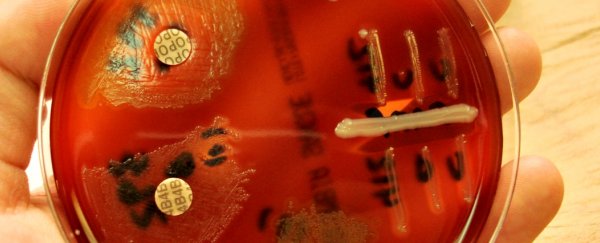A dangerous new variant of flesh-eating bacteria has been discovered, and researchers have found that it's already contributed to a spike in severe infections in the UK, Canada, Japan, France and Sweden.
Usually group A streptococcus bugs cause minor conditions, such as tonsillitis or mild skin infections, which are easy to treat with antibiotics. But in severe cases, the bacteria gets deeper into the body, where it can cause pneumonia, blood infections and necrotising fasciitis - a condition that eats away at human tissue. One in four patients won't survive this type of invasive infection.
Now a new subtype belonging to this dangerous group of bacteria has been discovered by researchers from the Imperial College London, after they noticed a sharp rise in the number of infections caused by a particular strain of Streptococcus, called emm89, between 1998 and 2009. They decided to investigate what was driving this increase by sequencing the genomes of bacterial samples taken from patients.
Looking at the genetic sequences, they found that the emergence of a new subtype of emm89 had coincided with the surge in cases. Scientists in Canada, Japan, France and Sweden have also reported a rise in emm89 infections, suggesting that the new variant of the bug is spreading globally.
The researchers have also identified two differences in this new variant that could have helped it become so dominant: it produces more toxin, and it's completely lost its outer capsule.
"The fact that it had lost its capsule was a complete surprise, because it was believed that the capsule was essential for group A streptococcus to cause invasive disease," lead researcher Claire Turner said in a press release.
Turner's team still isn't sure how the bug is surviving without its capsule, but it seems that it's actually helped it to become more infectious and invasive in the human body.
"We know that without capsule, they stick better to surfaces, so that may help them to transmit more easily," said Turner. "Another possibility is that they can more easily get inside human cells, which makes them harder to treat."
While there's no need to panic just yet because the new subtype of emm89 is still responding to antibiotics, scientists hope that by understanding more about how it's spreading so rapidly, they might be able to develop even better treatment strategies.
"Luckily, the new variant remains exquisitely sensitive to penicillin and related antibiotics. But we also need to think about whether our treatment strategies are as good as they can be," said Shiranee Sriskandan, the senior author of the research. "We know very little about how group A streptococcus is transmitted from person to person. We need to look into this more deeply and think about better ways to prevent transmission."
The results have been published in the open-access journal mBio.
